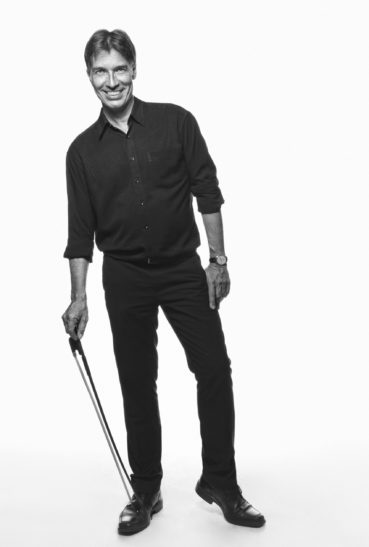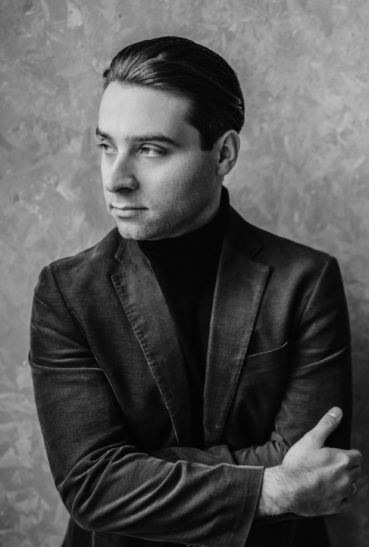DVOŘÁK | VANHAL | SKORYK
x
ATTENTION! We kindly inform you that the conductor of the concert has changed due to reasons beyond our control. Instead of Mr. Wojciech Rajski, the concert will be conducted by Mr. Rafał Janiak.
9 April 2022, 7:00 p.m.
Witold Lutosławski Polish Radio Concert Studio, Warsaw
Performers
Zsolt Fejérvári | Double Bass
Jerzy Semkow Polish Sinfonia Iuventus Orchestra
Rafał Janiak | conductor
Programme
Mykhailo Verbytsky Shche ne vmerla Ukrainy i slava, i volia – the national anthem of Ukraine
Antonín Dvořák – Carnival Overture, Op. 92
Johann Baptist Vanhal – Double Bass Concerto in E-flat major
***
Myroslav Skoryk – Melody A minor
Antonín Dvořák – Symphony No. 8 in G major, Op. 88
Zsolt Fejérvári – photo L. Emmer ; Rafał Janiak- photo Artist’s archive
x
In the tragic time of war when brutally attacked Ukraine is fighting for its freedom and independence, the programmes of concerts – frequently adjusted due to various circumstances – will also feature elements expressing support for this brave nation. The concert will therefore start with Ukraine’s national anthem, Ще не вмерла України ні слава, ні воля (“Ukraine has not yet died, nor her glory, nor her freedom”), the lyrics of which (written by Pavlo Chubynsky) are an intended reference to the incipit of Dąbrowski’s Mazurka. The beautiful piece, composed by Greek Catholic priest Mykhailo Verbytsky, was primarily meant to be used in a theatrical play. Forbidden in the Soviet Union era, it has later become an anthem of a reborn country (in its final form of 2003). The programme will also include pieces composed by artists representing the same generation of Ukrainian music who, however, followed different paths and stylistic trends. Myroslav Skoryk, born in 1938, was a prominent figure in Ukraine’s musical environment as a composer and musicologist, as well as an artistic director of the Kyiv Opera. His moving, romantic Melody in A minor was composed to the now forgotten 1981 film titled Vysokiy pereval and became popular in a number of arrangements. It was also performed during the funeral ceremonies for the victims of the pro-European Maidan Uprising in 2013/2014, murdered by Russians and forces favourable to puppet leader Viktor Yanukovych.
Antonín Dvořák’s Symphony No. 8 (1889) is a work filled with joy, optimism and references to national music, but remains devoid of an extra-musical narrative. Composed during a summer vacation in Vysoká u Příbramě, the work seems to reflect the bliss and the idyllic mood of time spent amidst the beauty of nature; the composer himself admitted that he wanted to create a piece “unlike his earlier works”, and it does, in fact, differ from the rhapsodic and sometimes dark atmosphere of Symphony No. 7, as well as from the ambience of its famous successor, Symphony No. 9, a piece full of pathos composed as a result of the artist’s journey to the USA. It is also known as the symphony “From the New World” (our orchestra performed it in February). The piece was written to celebrate the composer’s inclusion among the members of the prestigious Academy of Science, Literature and Art. It also achieved great success in the Czech Republic and abroad, and it remains one of the composer’s most popular works, along with the above-mentioned Symphony No. 9. Dvořák referred to program music relatively rarely, similarly to his friend and mentor, Johannes Brahms, who also preferred absolute music, free from any literary, narrative references. However, even Brahms composed concert overtures which may have been devoid of explicit narratives, but were nonetheless suggestive of extra-musical contexts. The great Czech composer also wrote such works, having created a less known trilogy of overtures (which can also be viewed as short, symphonic poems) entitled Nature, Life and Love. Composed in 1891, Carnival is the second and the most well-known part of this symphonic triptych. Impressive and overflowing with energy, the piece is a colourful, dazzling mosaic of dance motifs in the Slavic spirit, interwoven with episodes of nostalgic reflection.
The double bass is an instrument that is indispensable in the orchestra, as it creates the fondamento (the bass line in baroque scores) for the sounds of the string quintet. The instrument was rarely the centre of musical solos until the wide spectrum of its possibilities was recognised by the outstanding virtuosos of the 19th century, in particular, the Italian musician Giovanni Bottesini, known as the “Paganini of the double bass” by his contemporaries. However, this great Italian was not the first author of the original double bass concertos. They were written even earlier by other composers, including Jan Křtitel Vaňhal, a Czech and Haydn’s generational peer based mainly in Vienna, where he was known as Johann Baptist Wanhal. He travelled around Europe as a highly valued violinist and cellist. His Concerto in E-flat major will be performed by Zsolt Fejérvári, a Hungarian double bass virtuoso and a respected orchestral musician, the leader of the bass groups of the Budapest Festival Orchestra (BFO) and the Orchestre de la Suisse Romande. Fejérvári is also a very active soloist and a chamber musician who presents and records many forgotten pieces of double bass music.
The concert will be conducted by Rafał Janiak, one of the most interesting conductors (he is also a respected composer) of the young generation, who started his career as an assistant at the Warsaw Philharmonic with Antoni Wit (2012/13), and in the 2013/14 season – Jacek Kaspszyk. Since then, he has been regularly performing with orchestras, including Warsaw Philharmonic, Polish National Radio Symphony Orchestra in Katowice, Silesian Philharmonic, Cracow Philharmonic, Henryk Wieniawski Philharmonic in Lublin, Arthur Rubinstein Philharmonic in Lodz, Baltic Sea Philharmonic in Gdansk, Gorzów Philharmonic, Zielona Góra Philharmonic, Artur Malawski Podkarpackie Philharmonic in Rzeszów and Opole Philharmonic. In 2011, he made his debut as an opera conductor, conducting the premiere performance of W. A. Mozart’s Cosi fan tutte. Since 2016, the artist has been cooperating with the Lodz Grand Theatre, and from 2022 – also with the Baltic Opera in Gdansk. For the conductor-composer, contemporary music is close to his heart – he has performed many Polish and world premieres. Currently, he is the artistic director of the Chopin University Chamber Orchestra.
During the event the rules determined in the Ordinance of the Council of Ministers related to the establishment of the certain limitations, injunctions and bans due to the conditions of epidemic will be in force as well as their update: Current rules and restrictions.
Organiser: Jerzy Semkow Polish Sinfonia Iuventus Orchestra
The organiser reserves the right to change the programme or the performers of the concert
Media patronage: TVP Kultura, Presto, polmic.pl
Tickets:eBilet.pl, Polskie Radio – bilety24, eBilet as well as the ticket box of Witold Lutosławski Polish Radio
Standard price of the tickets; 40 zł/1 seat
Reduced price of the tickets: 30 zł/ 1 seat:
For:
• students, students before 26, pensioners and the persons after 70,
• students of the schools of music and ballet as well as the students of the universities of music and musicology departments.


